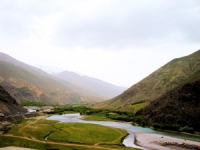Water sharing between Central Asian countries has been conflicting for quite a long time already.
Turkmen President: TAPI project plays important role in energy security

Implementation of the transnational Turkmenistan-Afghanistan-Pakistan-India (TAPI) gas pipeline project is assigned a specific role in the formation of the global energy security architecture, President of Turkmenistan Gurbanguly Berdimuhamedov said at a government meeting, the Turkmen government informed on Saturday.
As stated in the report, the President also focused on the tasks for creation of multivariate system of transportation of Turkmen energy resources to world markets, as well as on further promotion of Turkmenistan's international initiatives in the formation of the new architecture of global energy security.
According to Berdymuhamedov, "in this context, implementation of the transnational Turkmenistan-Afghanistan-Pakistan-India (TAPI) gas pipeline project is assigned a specific role."
Its implementation, as noted, will boost the economic potential of all member countries of the TAPI project, as well as contribute to strengthening regional peace, stability and security.
President instructed to intensify work on industrial development and development of new hydrocarbon deposits, as well as on consolidated modernization of the fuel industry.
The need to develop mutually beneficial cooperation with major international oil companies was also mentioned.
The basic document for the promotion of TAPI project is the Ashgabat interstate agreement of the state parties on the commencement of the practical implementation of the TAPI project signed in late 2010.
In May 2012, the Turkmen government has entered into an agreement for the sale of natural gas with India's GAIL ltd. Negotiations on formation of consortium and financial packages are being held under the auspices of the Asian Development Bank (ADB).
The Turkmen side conducted several international road shows for TAPI in September 2012 with the participation of the Asian Development Bank (ADB). It was reported that Chevron, Exxon Mobil, BP, BG Group, RWE, Petronas and other companies expressed intentions to participate in the project. According to Indian sources, the Shell Company is also interested in the project.
Bangladesh wants to join TAPI as a buyer. South Korean Korea Gas Corporation (Kogas) voiced offers on the TAPI in Ashgabat.
Russia showed an interest in the project, its implementation is also supported by the U.S., which was against a similar project from Iran to Pakistan.
The design capacity of the Trans-Afghan gas pipeline is 33 billion cubic meters of natural gas per year. The estimated length reaches 1735 kilometers. It is expected that the pipeline will extend from the largest gas field in Turkmenistan 'Galkhynysh' through Afghan cities of Herat and Kandagar to Fazilka settlement on Pakistani-Indian border.




